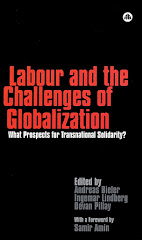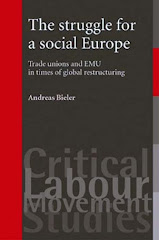According to the Trades
Union Congress (TUC), more than 150000 people participated in the march against
austerity and For a Future that Works in London on Saturday, 20 October 2012.
Affiliated unions up and down the country had mobilised, members from Unison,
the national teachers union NASUWT, the National Union of Teachers (NUT), the
Communication Workers’ Union (CWU), the University and College Union (UCU) and
others were clearly visible. The march was colourful, the mood buoyant, the
chanting intensive. Protesters were furious about the cuts to education,
privatisation of the NHS and large-scale restructuring in the public sector.
They signalled their willingness to resist. There was a feeling of empowerment,
of a possibility to go beyond the current ConDem government. And yet, is such
an optimistic assessment warranted?
In this post, I will
shed a critical light on British trade unions’ strategy against the austerity
budgets of the current ConDem government.











